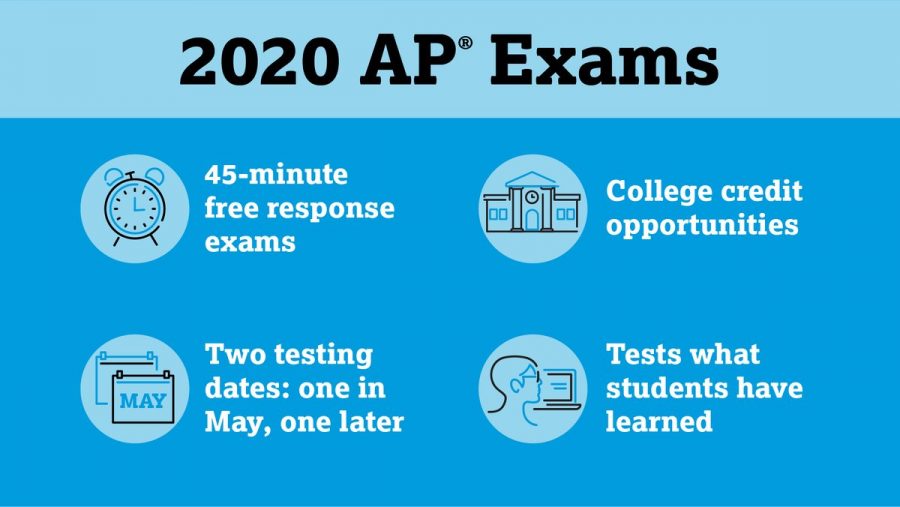College Board Changes AP Exams to be Open Note, Taken Online at Home
Info-graphic from College Board displaying key aspects of 2020 AP Exams
April 3, 2020
In response to the millions of students not at school due to the COVID-19 pandemic, the College Board has changed Advanced Placement (AP) exams normally completed in schools to be taken at home this year.
April 3rd, the College Board announced the dates and specific question types for each exam and that all tests will be open note.
The exams will still allow some students to gain college credit depending on their score and the school they will attend after high school. Students will complete their 45-minute exam on one of 2 testing dates available for each course through any device able to connect to the Internet. These abbreviated exams will cover approximately 75% of each course’s total content to compensate for the majority of students who only covered this amount of content when they left school in mid-March. The College Board has released the units that will be assessed on the exam for each course.
Many students, such as Wauwatosa West Senior Rachel Maria, are unsure of how the exams will ultimately go. This year, Maria is taking the exams for AP Calculus BC, AP Computer Science Principles, and AP Government and Politics.
“I’m used to taking AP tests in larger groups of people in larger rooms so it’s going to be really weird for me to have to adapt to taking AP tests in my own house. I can’t even imagine what it’s going to be like really,” Maria said.
Wauwatosa West Junior Brandon Simpraphone also has some worries about the changes made to the exam formats.
“I feel like it may inadequately evaluate each student’s college readiness, as it is shorter in length compared to a normal AP exam,” Simprahone said.
Simpraphone isn’t exactly sure how he’ll do on the exams he’s taking: AP Psychology, AP Biology, and AP Language and Composition. However, he thinks there is a possibility he’ll be more successful due to the changes.
“I do think I’ll be able to do better with this new exam format because I’ll be able to take the test in a comfortable environment in my home, as well as have more time to focus on studying with the amount of time I’m at home,” Simprahone said.
Other students, such as West Sophomore Kat Meyer, are also concerned about whether they will do relatively better or worse. Meyer plans to take the exam for AP Human Geography.
“It’s making me more nervous,” Meyer said. “I don’t know if I’m going to do better or worse. I’m definitely more stressed about it.”
Across the country, many students and teachers have expressed additional concerns about student access to internet and technology at home. College Board has provided a form for students “needing mobile tools or connectivity” or people who know someone that does.
College Board said that, “We know that not all students have access to the internet or a device. We’re working on solutions to help students get what they need to show their best work.”
Many students like Maria agree with the College Board’s decisions to continue with and adapt the tests given the circumstances, rather than refunding all students.
However, Maria still has some concerns: “I’m not sure that I agree with how much they’ve adapted the test and I think it’s gonna make it really hard for students to study.”
Maria and other students are upset that the studying resources they got in the past are no longer as useful.
“I am a little bit stressed about having to adapt to the new circumstances and finding new studying materials, especially on such short notice,” Maria said.
Given the circumstances, the College Board is offering optional, free, live AP review lessons leading up to the exams. The review lessons are delivered by AP teachers from across the country and are currently available on YouTube.
Many students are changing the way they study. They are especially focusing on free-response questions (FRQ’s) as no multiple-choice questions will be on the exams.
“I will focus solely on FRQ practice and may not take the same amount of time to practice as I would for a normal AP exam because it is so much shorter,” Simpraphone said.
Unlike Simpraphone, Meyer says the changes in the format will likely cause her to study more.
“Because there’s not multiple choice then I can’t do the process of elimination if I don’t know the answer to the question,” Meyer said. “I’ll definitely study a whole lot more.”
Many courses with project-based evaluations have had deadlines extended. College Board has also reduced the number of projects to be submitted.
The AP Computer Science Principles exam scoring is typically 70% based on a multiple-choice exam with the remainder project-based. However, this year the exam will have no multiple choice.
Maria is currently taking AP Computer Science and her class has already completed half of the projects before they knew that it will serve as the only material students will be evaluated on.
“I’m really going to try harder at the other half of the test we haven’t done yet,” Maria said. “Before that was only going to count for a much smaller percentage but now that it’s going to count for a lot more I’m getting a little bit anxious and I’m going to try a lot harder on the rest of the materials that we’re supposed to send into the College Board.”
Overall, students aren’t exactly sure what to expect.
Meyer said, “I’m upset that I won’t be taking a normal AP test, and that I’ll have to do it at home and on my Chromebook. It’s especially more upsetting since I’ve never taken an AP test before so this is entirely new to me and a new format for really everyone. It’s just kind of nerve-wracking.”















